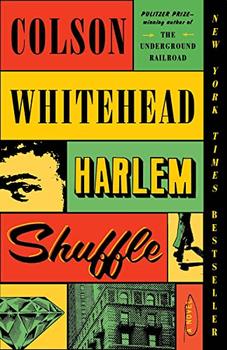Summary | Excerpt | Reading Guide | Reviews | Beyond the book | Read-Alikes | Genres & Themes | Author Bio

Colson Whitehead is known for revealing hidden worlds of bald and gritty violence, many times presented in a seemingly sanitized and pleasing package, which falls away to reveal a withering indictment of underlying social and racial ills. Harlem Shuffle is no exception to the rule, presented in a triptych of Hollywood-ready heists and colorful characters and set against the backdrop of Harlem near the end of the Civil Rights Era. We're lulled by the traditional tropes of gangster heists, complete with a full caper crew and surprising twists and turns, only to be faced with the sobering revelation that the true danger was never the guy waiting around the corner to clock you across the face, but rather the ever-present cold and insidious reality of racial privilege and power underlying the foundations of New York City.
Each heist takes place at a different time during the end of the Civil Rights Era, with connecting themes that explore the experience and evolution of Black America. The relationship between Ray, the main character who strives for respectability, and Freddie, his crooked counterpart, drives the exploration of what it means to be Black in America when one is limited within the confines of entrenched inequity. How does one attain success in a world that is so stacked against your kind? When we're first introduced to Ray and Freddie, as well as a cast of lively secondary characters, Whitehead sets the scene for how simple aspirations for money and power play out within Harlem. This expands into another heist a few years later, which explores a different type of struggle for success — one for reputation and exclusivity between classes. The final and most gut-wrenching heist reveals what true theft really means. Dovetailing with the end of the Civil Rights Era, we see revolutionary idealism become dashed with finality. We see how every attempt at change is ultimately a futile endeavor.
Whitehead is a masterful writer, able to present characters and scenes that draw us in with fast-paced action, while also slowing down to provide enough gratifying and diverting details that allow us to enjoy the historical backdrop where the excitement unfolds. He is cerebral enough to pepper his deceptively simple prose with reflections upon double consciousness, race theory and criticisms of capitalism and privilege. In spite, or because, of its high entertainment value, Harlem Shuffle can hit hard on issues pertaining to racial and economic inequality, and their lasting and fundamental impact upon New York City.
At the same time, while we're entertained, surprised and intellectually stimulated by the novel's outstanding execution, somewhere a beating heart is missing. The novel is so plot-driven and filled with so much, that Whitehead overlooks delving into the rich internal lives. It lacks in-depth ruminations on the motivations of why a person becomes a striver, a deadbeat, or a criminal, and the relationships between these types of individuals. The brief glimpses into the characters' lives where we do see these elements make us yearn for even more, such as the tender, comic and heartbreaking family dinner when Pepper, an estranged hitman from Ray's past, joins Ray's family. These meaningful moments are the sustaining force underlying all the superficial action and escapades, and there aren't enough of them to stave off that empty feeling one gets after a binge. We've just read three successive heists in which people die, disappear and are shuffled about without consequence. And when faced with the utter bleakness of the ending, the reader is left with very little to hold onto.
At the same time, perhaps in making us yearn for these tender, private moments and illuminations into the heart and soul of his characters, Whitehead is teaching us that power and privilege can only be truly subverted when we move away from the external to explore the untapped potential of the internal. The value of these moments is demonstrated by their scarcity.
![]() This review was originally published in The BookBrowse Review in September 2021, and has been updated for the
September 2022 edition.
Click here to go to this issue.
This review was originally published in The BookBrowse Review in September 2021, and has been updated for the
September 2022 edition.
Click here to go to this issue.

If you liked Harlem Shuffle, try these:

by Karen Valby
Published 2025
The forgotten story of a pioneering group of five Black ballerinas and their fifty-year sisterhood, a legacy erased from history—until now.

by William Boyle
Published 2025
As an Italian American family's decades-old secret begins to unravel, they will have to bear the consequences—and face each other—in this thrilling southern Brooklyn-set tragic opera of the highest caliber from crime fiction luminary William Boyle.
William Boyle is the master of Brooklyn-set crime ...
Your guide toexceptional books
BookBrowse seeks out and recommends the best in contemporary fiction and nonfiction—books that not only engage and entertain but also deepen our understanding of ourselves and the world around us.